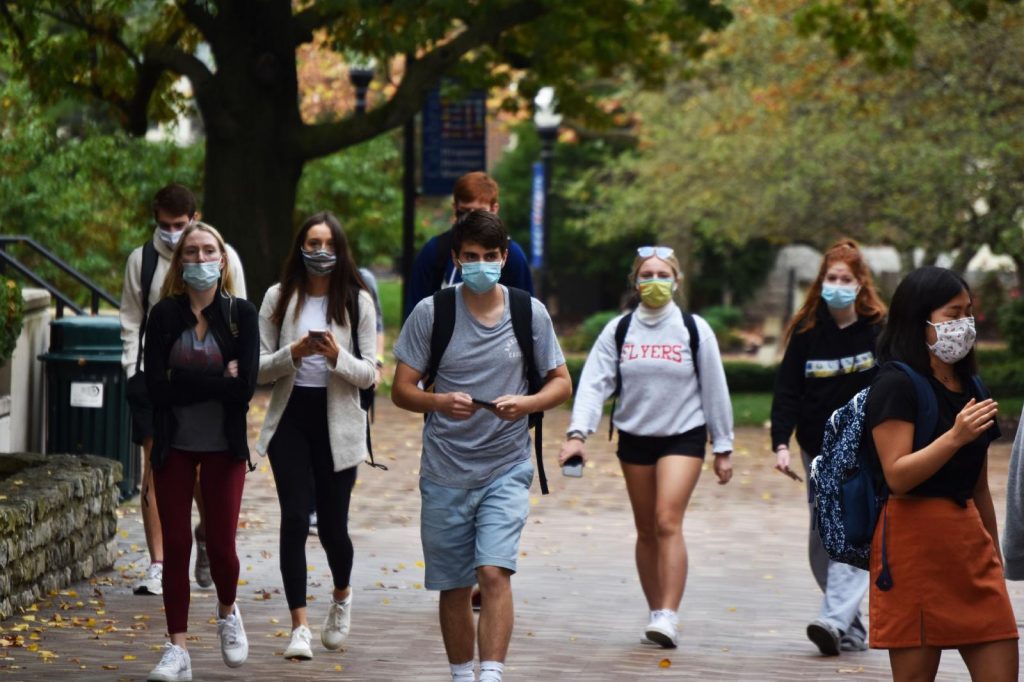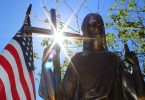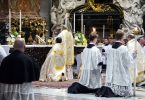
by Carol Zimmermann
WASHINGTON (CNS) — In a school year turned upside down by the pandemic, groups of students at the Marianist-run University of Dayton in Ohio have been striving to keep some things constant: supporting each other in their faith and reaching out to the school community.
The students, part of seven Marianist Student Communities on campus, have a road map for this because the group houses have been part of the campus for over 25 years.
But this year, of course, is different, with the pandemic impacting usual campus routines and forcing students to think up new ways to live as a community.
At the start of the school year, during a virtual retreat — already a sign of something different because it was not in-person — a Marianist sister told the group of about 40 students, part of this year’s student communities, that the school’s founders, the Marianists, had “been here before.”
That’s because a group of Marianist brothers came to Ohio from France at the request of the Cincinnati bishop and arrived when the city was in the midst of a cholera epidemic that killed 8,000 people. A year later, the brothers started a school on purchased farmland that was the start of the University of Dayton.
On the retreat, students were urged to think about how they would define themselves in this moment and also how they could apply the Marianist charisms of building community and sharing faith in this very different time.
Community life is an intrinsic part of the Marianist tradition steeped in an understanding that a person’s faith does not grow in isolation but needs the support and interaction of others.
This charism comes straight from the order’s founder, Blessed William Joseph Chaminade, a French priest who died in 1850 and believed the best way to rebuild the church after the French Revolution was through small faith communities dedicated to prayer, education and service to the larger community.
The Dayton students knew in theory what they had to do but building community when you can’t get have the usual group get-togethers is another thing.
The Marianist Student Communities, called MSCs, began in the late 1990s when Marianist brothers moved out of one of the campus homes where they had been living and some students asked school officials if they could live in that house and other campus houses to carry on the Marianist spirit.
This idea grew into an organized format where the student communities work with mentors and the university provides resources and formation opportunities.
What’s different this year, said LeeAnn Meyer, assistant director of Marianist Strategies – Student Programs with the university’s Office for Mission and Rector, is there is more of a focus on “making sense of the world; their reality is more difficult than normal.”
The groups commit to praying together and sharing at least one meal together and to building community with the university at large which in previous years involved hosting monthly chili cookouts or chocolate and chat sessions at their homes.
Morgan Day, currently a graduate student at the University of Dayton, lived in these communities during her junior and senior years. Her senior year experience, last year, came to a halt when students moved home at the start of the pandemic in March and then continued the semester online, returning to school in the summer just to pack up their belongings.
Day said she and a group of friends “wanted to live in a more intentional way than just roommates.” She described the living situation as “making a commitment with people to show up for one another and pray with one another about highs and lows.”
“I will forever be different because of it,” she told Catholic News Service prior to the Thanksgiving break.
When the tight-knit house members were suddenly dispersed in late March, she said, she was heartbroken they were “losing this time together,” which at first was assumed to be just for two weeks. When two weeks turned into the rest of the semester, she said the group kept in touch with each other and continued to be a source of support.
“It was not the semester we anticipated,” she said. She also wishes she “cherished more of the moment” of what they had before it abruptly ended.
Claire Evans, a senior, who is part of the Marianist Student Communities for her second year, definitely feels the difference this year, due to pandemic-related restrictions, but she also feels, with the year’s many uncertainties, a deeper challenge to her faith and stronger support from her housemates.
Where these communities would typically be hosting monthly events for the school, primarily focused on just getting together, this year her house decided to host one event — with school permission and outside with social distancing — focused on self-care: providing resources for students and making stress balls.
The point, she said, was to acknowledge “it’s hard to be a student right now” and to invite students to know “we’re thinking of them and praying for them.”
The start of the school year was tough. The first two weeks were only online classes and students were to essentially remained isolated. “It was really hard to abide by these rules emotionally, to come to terms with not having people over,” Evans said.
But she also thinks that because this isn’t just a struggle she is going through, but something all five of the women in her house are dealing with, it “definitely adds a level of closeness.”
“In a normal situation, we would be close, but this is a different element,” Evans said. “Years from now when we visit, this will keep us close, remembering we struggled through the pandemic together.”
Evans is the 19th person in her extended family to go to the University of Dayton. Her parents both went there as did her older siblings and cousins, so she knew about the student communities and felt they would be a good fit because her family has always integrated faith with everything they do.
“I was attracted to the idea of an intentional community that would have a meal together, pray together, go to events together and be present to each other’s needs versus being with random people in a random house. This helps us be more integrated into each other’s lives and forces us to reflect on the struggles and joys connected with our faith. It’s so cool,” she said.
In her house, they have Sunday brunch together and pray with each other on Monday nights. During the week they check up on each other, asking if each other is doing OK. The group gatherings each month with other student community members and a speaker happen over Zoom this year, which she said isn’t the same as getting together in person, but the breakout groups, where they meet for online discussion, still work.
Evans said the school year has so many unknowns to it, from what’s the right choice to make about one thing or another, to what does the future hold. She relies on her faith to “get through each day” and to “not be freaked out by the future.”
Looking at things through the lens of the pandemic also makes you see what is really important, she said, noting that she and her housemates and students in other Marianist Student Communities talk about this all the time. “We are all on the same page. We’re not alone in figuring out how to be students, and seniors, in a pandemic. “
And even though the students went home at Thanksgiving and won’t be back on campus until January, Evans said their eventual return is part of what is special about the campus at this moment.
As she put it: “It’s letting us process through what’s going on in the world around us.”






